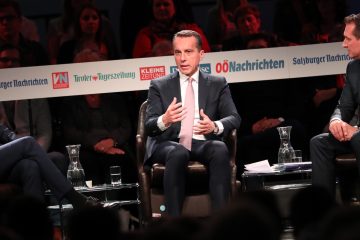
Social Media: The Creative Destruction of Pakistani Politics
Around 400 years ago, Galileo Galilei of Pisa challenged the authority of the Catholic Church through his remarkable new invention: the telescope. Back then, the Church strongly influenced what people believed: that the earth was at the centre of the universe, with all other celestial bodies revolving around it, a phenomenon known as geocentrism. However, using the telescope for his observations, Galileo opposed this assertion, placing the sun rather than the earth at the universe’s centre. Naturally, this heliocentric model challenged the Church’s authority. The telescope marked a significant milestone in disproving the Church’s stance, leading to Galileo’s infamous trial in the Inquisition, where he was charged of heresy. But the damage had already been done. Seeds of doubt had …

Politics in Nigeria After Social Media
A Pew Research Centre survey showed that citizens of 19 advanced economies consider social media simultaneously constructive and destructive in political life. A majority of citizens believe that social media has had a positive impact on democracy. What about frontier economies? How has social media affected politics and political interaction in African countries with rapid population growth, increasing life expectancy, and widespread poverty? Consider Nigeria. In mid-2017, Nigeria was the most populous nation on the continent. By 2050, Nigeria will be the third most populous nation in the world. This large population has increasingly adopted social media. There were approximately 33 million users in 2022, up from 18 million in 2017. Young people aged 18 to 34 make up the …

Politics as content: populist performance and discourse by reactionary political influencers on YouTube
Marketing itself as a corrective to the monopoly of mainstream media, YouTube has reduced the barriers of access for people to create and star in their own content regardless of their economic and cultural cachet. Among those taking advantage are “political influencers” or “ideological entrepreneurs” – creators who disseminate and monetise politics as content using the techniques of brand influencers to grow audiences. In part shaped by the platform they are on, creators selling politics suffuse their discourse and performance with an anti-elite and transgressive messaging. Ultimately, this has implications for the legitimisation of conspiracies and the mainstreaming of the far right. As with any type of influencing, the creator is the central figure, performing a relatable and authentic identity …

Social Media and the Subscription Subject
There is a burgeoning element of social media: subscription services. One might assume that Elon Musk’s announcement of “Twitter Blue” was the spark for social media’s subscription service. In fact, taking a step back one could have seen the writing on the wall. An early and famous (yet implicit) statement on subscription services came from Mark Zuckerberg. In April 2018, Zuckerberg was brought to the US Senate to be questioned about Facebook’s role in the 2016 US Presidential election. During his appearance, former Senator Orrin Grant Hatch asked Zuckerberg, “In 2010… you said back then that Facebook would always be free. Is that still your objective?” to which Zuckerberg responded, “Senator, yes. There will always be a version of Facebook …
The New ‘Worldmakers’: How the 20th Century Black Anticolonial Dialogue Reveals the Strategic Importance of the Milk Tea Alliance
Growing tension in Berlin. A proxy war in Korea. The escalating Space Race. The world—and particularly its realists—focused on the evolving great power competition between the United States and Soviet Union during the Cold War. However, in the shadows of this marquee battle, black leaders such as Kwame Nkumrah, Eric Williams, and George Padmore drove an anticolonial dialogue that sought to transform the international order on their own accord. Their core mission: to reframe sovereignty, reconceptualising it as self-determination and the elimination of racial hierarchy. This weighty conversation, which took place from the 1950s to the 1980s, doesn’t seem related to an Asian meme war in 2020. However, amidst a new, growing Cold War between the U.S. and China, the ‘Milk Tea Alliance’ has emerged as the newest supranational …

Can Facebook govern itself?
It has been a tough few years for Facebook. Following Cambridge Analytica and the Russian interference in the 2016 election to ‘Definers-gate’, Myanmar, and a host of other crises, it is clear that, as Mark Zuckerberg has even now stated, ‘regulation is coming.’ Competition authorities, privacy regulators, and electoral commissions are all now grappling with the influence of big tech, but in the meantime, Facebook has begun implementing a series of much-needed policy changes and self-regulatory tweaks. In particular, transparency has emerged as a key means through which Facebook has attempted to regain the trust of the public, politicians, and regulatory authorities. These efforts are clearly no substitute for effective regulation, but have had an immediate impact that is worth …

Eyes Wide Shut: Seeing and Being Seen in Late Modernity
Since the 2013 Snowden revelations, public concern over privacy issues has reached a shrill register, regularly amplified by periodic new scandals. Anxious computer owners, following the lead of Mark Zuckerberg, have taken to covering their cameras with bits of tape. Messaging services tout their end-to-end encryption. Researchers from Harvard Business School have started investigating the effectiveness of those creepy online ads that seem to know a little too much about your preferences. And behind all of these trends sits an uneasy public: according to a 2014 Pew Research Center Poll, fully 91% of Americans believe they have lost control over their personal information. Ian Bogost in The Atlantic names the enemy behind the assault on our privacy: It’s “a hazy …

Making Enemies: The Silberstein Affair and the Austrian Election
Much has been written about the Austrian Parliamentary election 2017 and its aftermath. Sebastian Kurz (ÖVP) recently became Europe’s youngest head of government after reaching a coalition agreement with the right-wing FPÖ. He had cleared the path to becoming Austrian Chancellor by defeating incumbent Christian Kern (SPÖ) in a controversial election. This article examines the so-called Causa Silberstein, exploring the reasons that turned the affair into a scandal, and asking if it contributed to the defeat of the SPÖ in the Austrian Parliamentary election. The Silberstein Affair At the end of September, Austrian magazine Profil reported that Kern’s Israeli political consultant Tal Silberstein was behind two Facebook pages: ¨Wir für Sebastian Kurz¨ (¨We for Sebastian Kurz¨) and ¨Die Wahrheit über …








